June 16 - 22, 2013: Issue 115
Transcription of Speakers at Community Consultation by the Independent Local Government Review Panel at Dee Why
June 4th, 2013
Professor Graham Sansom- Chair of the Independent Review Panel attending.
On Tuesday 4th of June 134 people from community groups and residents of Pittwater attended the community consultation session conducted by the state government appointed Independent Review Panel.
The evening opened with Professor Graham Sansom- Chair of the Independent Review Panel, showing graphics to give insights into how the panel were now reaching a “crystallised” stage of what will go into their final report to the NSW State Government.
Professor Graham Sansom then invited the first of 13 people who had applied to speak to give their presentation into matters they wished taken into account when drafting the final report for state government, the follow on from the November 2012 Better, Stronger, Local Government: The Case for Sustainable Change and April 2013’s follow on from that Future Directions for NSW Local Government: Twenty essential Steps.
Professor Sansom requested that all speakers not repeat anything anyone else had already said once their turn came.
We have also omitted two speakers who spoke on matters not relating directly to the matters in the papers to be discussed.
Harvey Rose former Councillor and former Mayor of Pittwater on behalf of the People for Pittwater:
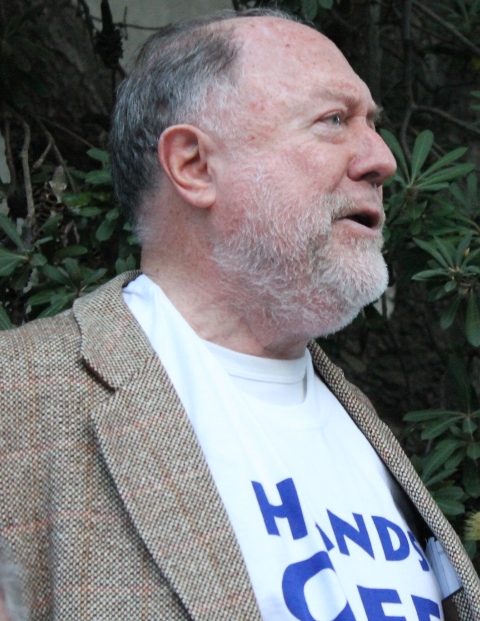 Thank you very much for your presentation (To Prof.) but I cannot see any reason why that presentation would lead to a recommendation for the merging of our councils. I cannot see in the latest report any reasoning or detail for the recommendation of the amalgamation of our councils. I’m at a loss to see what they are.
Thank you very much for your presentation (To Prof.) but I cannot see any reason why that presentation would lead to a recommendation for the merging of our councils. I cannot see in the latest report any reasoning or detail for the recommendation of the amalgamation of our councils. I’m at a loss to see what they are.
I speak for People for Pittwater which was formed late last year which was put together by former mayors and community leaders from the save Mona Vale Hospital Committee and Friends of Currawong members. As you would know we have put in a submission to this forum.
I would stress at this point that the panel has a moral obligation and responsibility in this matter. It’s not just economics or some theory about when this model should be employed in Sydney, it’s about things that people are connected to, that underpin our everyday life. Most of all it’s about community connection, community. The panel must recognise that it has a moral responsibility, I want to stress this because it doesn’t get stressed often enough, you’re not just playing with people, you’re playing with people’s lives, and their connections. There’s a moral ethos, and if you do the wrong thing, if you undermine the connections we have, as we do have a connection to our councillors most other councils do not have in community structure, in community actions. There is abundant evidence today of overwhelming of community support against amalgamation.
I would like to reiterate the level of community support we have in Pittwater; specifically, I remember how hard our community fought to establish Pittwater Council to ensure the unique and environmental character of the local area was properly represented. I do not think an adjacent council and amalgamation with them would benefit us. I strongly support a local identity and democracy provided by our own council which has served us faithfully and well over the past 20 years. We have 60 thousand people in Pittwater, already an above median population per council.
Our submission also talks about financial liability. Our council, according to recent reports, is among the top 30 of NSW Councils to have financial stability, as seen in the report of May 2013. If the council’s among the top 30 as far as financial stability and the council’s beside us are finically stable, why would you want to combine us? Why would you want to cause problems?
Why do you want to cause all the financial problems of bringing us together to end up having to then go through what has happened in Queensland where councils that were forced to amalgamate and now having to de-amalgamate once more at considerable cost to those councils on top of their previous amalgamation costs.
Pittwater Council has of course finally been recognised as a successful council with the Bluett Award for most progressive Council and the best council in NSW.
The way forward for our region is what we have suggested before, is to build in all regional areas something similar to what we already have here in the form of SHORAC where we get together on all community issues; on health, on transport. This has worked marvellously for us and millions of dollars have been saved so far, it is already working.
Our shared services will come. All of those things will come. Why interfere with something that’s already working? Why would you de-stabilise it ? Why would you upset everybody? Why would you mess up the financial viability of three financially viable councils by talking about amalgamating them? I really do not understand the basis for your current report’s recommendation. I ask that the Panel recognise that Pittwater Council is held in high regard and affection by our community and our community, I assure you, will mount a vigorous campaign if there is any move towards a forced amalgamation. I will say in closing on this issue a few paraphrased words from Dylan Thomas;
The people of Pittwater will not go gently, they will rage and rage against the dying of the light!!
Shane Withington on behalf of the Friends of Currawong:
Thank you very much. Firstly; No!, it’s a bad idea. (To Prof.)
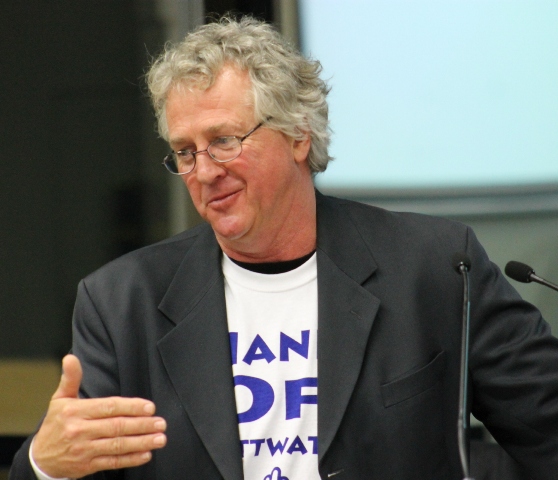 Pittwater Council, as you would know, was born of the people. We de-amalgamated, we broke away from a council that was sending the high rise ever further north like those you see down here (at Dee Why). We felt more then ignored and abused by the members of the then current council.
Pittwater Council, as you would know, was born of the people. We de-amalgamated, we broke away from a council that was sending the high rise ever further north like those you see down here (at Dee Why). We felt more then ignored and abused by the members of the then current council.
Small is good. Pittwater Council is available to the people, the councillors are accessible. You can confront them in the street, they love being confronted in the street. If you call them, they answer their phones. But importantly it is a council that was fought for, a council that is new, and a council that was made by the people to escape a larger council. So no!
Secondly; we are used to bad ideas coming from the state government. The state government though it was a great idea to shut our hospital; what? That’s a bad idea…that’s a really bad idea. And it took these people, in this room, years and years of dedicated fighting to save our hospital and the people running it and they should be congratulated. That would not have happened, I don’t believe, under a super council, because you are then divorced from the seat of power. The further away you are the less power you have. We can access our councillors in Pittwater.
The other bad idea regarding Pittwater that came from state government was to build basically another suburb inside the National Park at Currawong. That was an appalling idea. They wanted MacMansions to be built inside a park that’s on the state heritage register. They wanted to destroy the National Trust listed cottages and pick up the heritage listed homestead Midholme and take it away. These are bad idea, but people here fought for 15 years against overwhelming odds, against panels similar to yours.
Pittwater is not a square on a map, it’s not Chatswood, it’s not Brewarrina, it’s not Mudgee. It’s the Tasman sea, it’s a thin strip of land that has been ecologically sustained. You have Pittwater, then the Kuringai Chase National Park and then the Hawkesbury River, it’s not your average council area. It has a lot of very specific issues that must be maintained and we care about them and cared enough about it to fight to secede and so naturally when we are threatened with these kind of things happening or these proposals are raised we will fight. We don’t want to become more of Warringah, we don’t want to become Balgowlah by the sea, we want to have what we have now because it is a very successful and a very viable council.
Council amalgamations failed in New Zealand. I don’t believe they were successful elsewhere either.
I think it’s disappointing that you state your ideas have crystallised before anyone has had a chance to speak. We’re coming second already in this debate. It’s also nice to see that you’ve cited the UK as a recipe to follow for council amalgamations here. I’m here to tell you that the UK is not the recipe for here. The map I saw of councils in distress were in western NSW. Maybe we should be talking about amalgamations of council’s in NSW because we don’t want that here. We like our council as it is.
Robert Dunn, former Councillor and former Mayor of Pittwater:
Ladies and Gentlemen,
Thank you for the opportunity to make a submission, and for previously, through your chairman, hearing my address. As I then stated, I believe that your paper. “Future directions for NSW local government-20 essential steps,” was extremely disappointing in many respects.
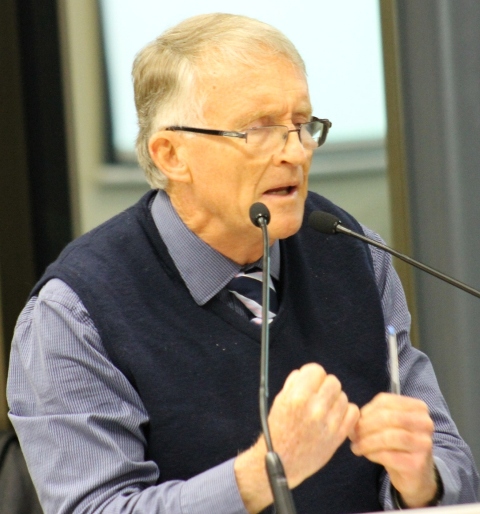 To begin with, you seem to have completely overlooked all but one paragraph of your terms of reference. The first four paragraphs of your terms of reference, with respect make no reference to amalgamations whatsoever. They emphasise the need to address future needs of local communities and include the important requirement of the ability for local representation and decision-making. Yet you focus only on point number five-“barriers and incentives to encourage voluntary boundary changes.” In the guidelines that follow, you also only focus on the fifth dot point “take into account the Liberal-National’s 2011 election policy of no forced amalgamations.” You also apparently allow yourself to be dominated by the referral to the “State Plan”, which apparently includes some form of lip service to becoming the biggest and/or best state, and or making Sydney, a pre-eminent global city.
To begin with, you seem to have completely overlooked all but one paragraph of your terms of reference. The first four paragraphs of your terms of reference, with respect make no reference to amalgamations whatsoever. They emphasise the need to address future needs of local communities and include the important requirement of the ability for local representation and decision-making. Yet you focus only on point number five-“barriers and incentives to encourage voluntary boundary changes.” In the guidelines that follow, you also only focus on the fifth dot point “take into account the Liberal-National’s 2011 election policy of no forced amalgamations.” You also apparently allow yourself to be dominated by the referral to the “State Plan”, which apparently includes some form of lip service to becoming the biggest and/or best state, and or making Sydney, a pre-eminent global city.
Whilst you’re supposed to make sure that your recommendations meet the different nature and needs of regional rural and metropolitan communities-you finish up with only the one concept for enormous super councils-a policy which may be summed up as “Enormity by conformity “ or one cap fits all.
You start off apparently justifying this approach by reference to the financial sustainability argument suggesting that amalgamations are necessary, because of the financial predicament of many predominantly rural councils. When you come to the metropolitan area, you change this argument by suggesting that western Sydney councils are enormous in size and you suggest the other financially stable but smaller councils have to conform with this size structure-to fit into the concept thus “enormity by conformity.”
Although you pay lip service to keeping local government “local”-none of your arguments or recommendations come anywhere near this concept.
You suggest that perhaps having some sort of district forums would fill the void.
You fail to make any distinction between a small local community being able to be self-governing, as distinct from having some advisory role without any actual say in self-determination.
You refer to the New Zealand and the United Kingdom experience of large regional councils and as well as Queensland and Victoria, following their forced amalgamations. You acknowledge that the policy in Queensland has somewhat failed in that there is now a strong move for de-amalgamation, which is an extremely expensive process, and yet some communities still desire to take that course and shoulder that expense. You fail to mention the Victorian example, where there has been little evidence of the cost benefits that were claimed before the process started. You also failed to point out that the New Zealand and United Kingdom examples are within a system of national government, but not State government. Hence the analogy does not have any bearing since the State government itself can be seen as a regional government within the Australian governmental system.
In relation to the argument about financial matters necessitating amalgamations, you fail to take into account the fact that State government policies over many years of rate pegging have probably been the main contribution, rather than mismanagement by the councils themselves to the crisis in sustainability that has occurred.
Perhaps the greatest disappointment is the lack of a intellectual rigour that appears to have been applied to your deliberations so far. Instead of weighing up the “big” options against the “small” options, you have rather simply adopted the “big” option and disregarded the rest. At the time when Pittwater Council was formed, the Boundaries Commission of New South Wales followed a most rigorous process in putting the new proposed Council to the test. One of the intellectual arguments that was considered and debated was encapsulated in the studies of Prof Michael Jones and his book on Australian local government. In that book, Prof. Jones argued strenuously and logically that the advent of modern technology had rendered obsolete, the arguments of economies of scale-simply because these economies are available without adopting the huge bureaucratic administrative structures previously advocated by the “big is better” school of thought.
The councils of Pittwater, Warringah, Manly and Mosman are well served by the SHROC voluntary and cooperative organisation, which allows retention of individuality and local democracy, whilst assisting councils to adopt a collective approach at a business or commercial level.
Furthermore, councils are able to widely sub-contract services directly themselves from larger corporations in the business world without having to adopt the bureaucracy of large management in doing so.
Overseas, there is the example of Switzerland, which rejected altogether, the large centralised governmental approach in favour of a collective of smaller local entities or Cantons. In northern France, there are the examples of many Councils consisting of just a Mayor, and a few personal assistants able to contract for all services and public works without any large or structured bureaucracy at all being necessary.
In defining your concept of “large” fits all-you suggest that (see page 45):
“it should not be so large as to challenge the primacy of the State but have the stature, maturity and skills to be a respected partner and to develop a productive working relationship with state and federal agencies.”
One could say that if you are really “an independent” panel, you might well consider that you should be recommending an end to State government rather than pandering to its ego to be number one again. You would not seek to justify your argument at and of amalgamation of the North Shore councils of Sydney simply on the basis of reducing what you refer to as “excessive fragmentation into small or relatively small units”, by suggesting that retaining those financially sustainable and efficient small units simply cannot be allowed within the “big model”, because it would be inconsistent with the “super council model”, as advocated by you.
Far from referring to your terms of reference, you justify your whole approach by harking back some 40 years to the Barnett commission in 1973, and you ignore everything that has come since, including apparently modern technology, and for that matter, the Pittwater experience in becoming the first Council formed in New South Wales by secession in 1992. Pittwater Council although deprived of substantial reserves and having to start from a very thin base has proved to be successful in winning the Bluett award for outstanding local government and continuing to meet the needs of its residents and ratepayers over the period of 21 years since its proclamation. Pittwater Council owed a great deal of course to some of its smaller neighbours such as Lane Cove Council; Manly Council and Hunters Hill Council. To dismiss these small successful councils as simply “fragmentation” , against the reincarnation of the big amalgamation models of 1973 is simply outrageous and insulting and as mentioned requires the unthinking acceptance of your concept of “enormity by conformity” or is it “conformity by enormity”.
Either way it is undemocratic and unacceptable.
With respect you should readdress your terms of reference and find a more subtle and intelligent approach to local government “reform”.
You should allow in your deliberations for individuality and for efficiency from smaller organisations.
Respect comes not from sheer size but from the way you look after your community, from how you put democracy into effect.
You do not have to go back to 1973 to find those solutions.
Peter Mayman on behalf of the Avalon Preservation Society
I am speaking tonight on behalf of Avalon Preservation Association, a community group active within Pittwater for the past 52 years. 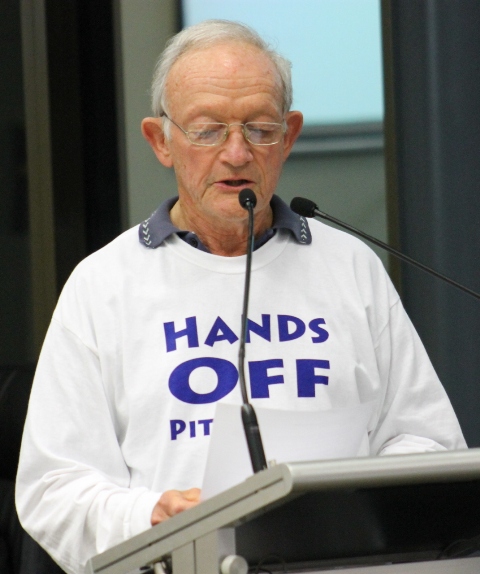 Tonight, we want to focus on your paper "Future Directions for NSW Local Government" and the issue of amalgamations.
Tonight, we want to focus on your paper "Future Directions for NSW Local Government" and the issue of amalgamations.
We note that your review is apparently being driven by a requirement that NSW is:
QUOTE "once more to become Number One "
and that: QUOTE "Sydney's population will be around 7 million."
We question these assumptions and ask what does Number One mean---is it for example to have the highest number of new building developments per year ?? and do we want to have 7 million people??
We submit that you should be questioning both of these assumptions and seeking the views of the people of NSW.
Your proposal to shrink to 15 councils in metropolitan Sydney is based on:
QUOTE "There is simply not enough revenue or sufficient numbers of skilled staff to sustain 152 councils across NSW".
You go on to argue that:
QUOTE "mergers should be pursued where they can make a substantial contribution to addressing financial problems, reducing fragmentation of resources and duplication of effort, and building strategic capacity for the long term".
There may be a case for mergers to be pursued in some parts of NSW, but in the case of Pittwater none of these pressures are applicable. Finances are strong [in the top 30 in the state]. There is no problem of fragmentation of resources, which, where appropriate, are dealt with by shared resources, for example the Kimbriki waste facility, and further, Pittwater's long term strategic capacity is assured.
You may be tired of hearing claims of many areas being special or unique BUT some can be more unique than others! and Pittwater is truly unique.
It is truly unique. Why?-because it is the only council in 100 years to be devolved and separated at the demand of the residents in the Pittwater area because Warringah failed to recognise the needs of a socially, environmentally and culturally different area.
Pittwater residents have already paid an additional levy for seven years and now paying a Special Rates Variation of some 30 million dollars, on top of their rates, for the next ten years. This is to rectify the neglect and misallocation of expenditure by Warringah council prior to separation.
This separation has been highly successful and the idea of being forced [or induced] to re-merge after only 21 years is unthinkable to a very large number of Pittwater residents---indeed some are saying it is so ridiculous they are not going to think about it [so they won't be here tonight].
Separation has been successful partly because Pittwater council has been harmonious, non political and non-factional and at every stage has attempted to consult its community and has successfully managed its finances.
Pittwater does have relatively high rates. This is due in part to the need to maintain a large number of beaches, wharves, seawalls, waterways and paid lifeguards. These are special features enjoyed by locals but also by visitors from the whole of Sydney and large numbers of national and international tourists. It is therefore not credible to claim that amalgamation will see a reduction in the rates of Pittwater residents.
We applaud your reference to:
QUOTE "the importance of keeping the local in local government--the sense of place and community identity so important to the quality of peoples' lives "', but we see no evidence of this in your proposals. Indeed we see the opposite.
You state:
QUOTE "Opponents of amalgamation rely heavily on the argument that local identity will be lost in bigger local government units, that larger councils will pay less attention to specific needs of different suburbs or neighbourhoods and will fail to take steps to maintain their character. Certainly people may fear that this will happen. "
Yes! This is not just a fear, it DID happen. These are the very reasons that led to Pittwater's separation.
You state:
QUOTE "The objective will not be met by self interest and special pleading."
We ask you to reconsider this. Surely the whole point of consultation is to hear local and probably self interested but definitely informed views, remembering the quote "keeping the local in local government".
Our special pleading is based on the unusual and one-off history of the birth of Pittwater and its ongoing success.
WE URGE YOU TO WITHDRAW YOUR RECOMMENDATION FOR ITS RE.AMALGAMATION.
Peter Mayman (Chair)
Avalon Preservation Association
Mark Walsh
Thank you; Let’s recall these words…that government of the people, by the people, for the people, shall not perish from the earth.
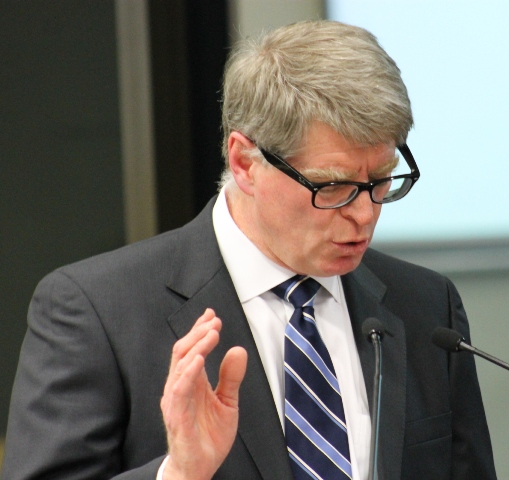 Lincoln’s words at Gettysburg still crystallise the essence of government. Pittwater Council is measures up to this test, so does Warringah council, so does Manly council. Earlier this year I had the experience of local government in action when a modern day dispute between neighbours came before council. At the fortnightly meeting council gave both sides a full and fair hearing and the benefit of their decision form which no member of the public was shut out. Their dispute resolution was based on a fair decision process took into account the views of the neighbours and interested groups. It was government in action and by our form of local government we entrust to our councillors our plans for our environment. They were elected so we can have a say in who looks after our interests and they are responsible to us. We like this model, we like that our councillors take their duties very seriously and we respect them for their sacrifice and for the time that they contribute to us. For that we thank them.
Lincoln’s words at Gettysburg still crystallise the essence of government. Pittwater Council is measures up to this test, so does Warringah council, so does Manly council. Earlier this year I had the experience of local government in action when a modern day dispute between neighbours came before council. At the fortnightly meeting council gave both sides a full and fair hearing and the benefit of their decision form which no member of the public was shut out. Their dispute resolution was based on a fair decision process took into account the views of the neighbours and interested groups. It was government in action and by our form of local government we entrust to our councillors our plans for our environment. They were elected so we can have a say in who looks after our interests and they are responsible to us. We like this model, we like that our councillors take their duties very seriously and we respect them for their sacrifice and for the time that they contribute to us. For that we thank them.
There’s a difference between state and local government, councillors are elected explicitly by voters and it’s a form of government that is very different from state government. The state government has a much broader reach; it looks at the allocation of state wide matters such as education or state wide railways whereas local government takes place within our community and is subject to ongoing and constant consultation with our community. That’s its genius, that’s its success, that small is beautiful, that very point.
The state government has very important business but it’s located in Macquarie street essentially and consults with the broader community around the state and that’s the difference between the two. An enlargement of council areas will mimic the state government in duplication. Whereas in Pittwater we have access to our councillors; if we see them on the street or at the beach or pool we talk to them, we’re not subject to some faceless executive or minister who determines the changes to the community, which in the case of our still recent split, was far from the consultation process or responsible action.
The essence of this is that we live in an environment not an economy.
Eye contact with one’s peers, our contact with our councillors and its officers, gives us our sense of community; not having to contact or deal with someone who operates just on numbers. Einstein said ‘not everything that matters can be measured and not everything that can be measured matters.’
Spare a thought for the public servant closed in an office making a decision on abstract and theoretical matters on regional government in a rational way and without the benefit of the feedback that councils receive. Larger bureaucracies also become great lobbyists and it is of course a source of great annoyance to a lobbyist that they cannot exist in a municipality or a small region.
We’ve heard earlier about Switzerland; it’s success is due to ‘bottom up’ processes, by comparison the pharaohs and every government since in Egypt has been ‘top down’ and spun numerous smaller units.
We know that twenty years ago Pittwater Council became a reality and since that time the residents of Pittwater have determined our planning instrument to project our vision. The heart of that vision is Pittwater Council’s mandate and we, the residents of Pittwater, wish to preserve our council for the benefit and enjoyment of the residents and also most importantly for our guests, our visitors, many from overseas.
The amalgamation of our council will reduce the opportunity of council for community consultation and lessen responsible representative government. We are custodians of a great place of national beauty; this we do through our council of Pittwater, through planning policies and protection of the lands that we hold in trust. Finally I would like to acknowledge the traditional owners of our land, the Guringai and other peoples on whose land we now stand. I pay my respects to the elders past and present.
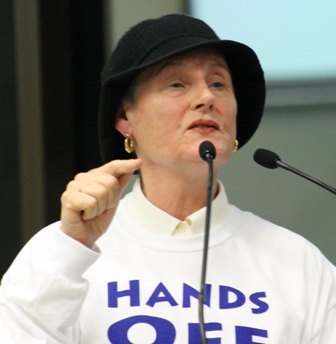 Eunice Raymond on behalf of Save Mona Vale Hospital Committee and Co-convenor of People for Pittwater
Eunice Raymond on behalf of Save Mona Vale Hospital Committee and Co-convenor of People for Pittwater
Claims that amalgamations will enable economies of scale are spurious. Pittwater Council is a well run and efficient body. It must account for every dollar spent from a tight budget on which many calls are made. Its financial reports are regularly published and are easy to read. The ratepayers can see if there is wastage or inefficiencies ( more than what can be said of state and federal regimes). Pittwater Council is also optimum size to enable community input. Local government is primarily about participatory democracy. It is our only chance as state and federal governments are, by their nature and size, representative governments. Consequently, it is imperative that we maintain our independence.
As Chair of Save Mona Vale Hospital Committee we have seen the outcome if, as part of a much larger body, Pittwater matters are ignored. In our fight to save the hospital we were totally ignored by both Warringah and Manly Councils. Indeed, we were actively opposed. Pittwater council must remain a separate autonomous Local Government Area.
Tony Eadie: thank you Mr. Chairman, ladies and gentlemen.
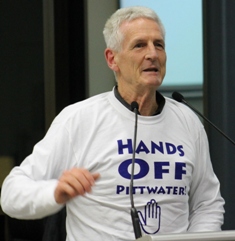 I have a long history in Pittwater, Pittwater has a long history itself. It started out with rum coming into the area via Barrenjoey and a Custom’s Station was set up to tax those doing this. My grandparents in the 1940’s and 1950’s owned the Newport Arms Hotel. I was born in the Hunter Valley and we used to come down here for holidays and stay with them.
I have a long history in Pittwater, Pittwater has a long history itself. It started out with rum coming into the area via Barrenjoey and a Custom’s Station was set up to tax those doing this. My grandparents in the 1940’s and 1950’s owned the Newport Arms Hotel. I was born in the Hunter Valley and we used to come down here for holidays and stay with them.
I’ll make this brief because we all feel the same thing here tonight. Pittwater has for a long time been the a!s! end of the peninsula but it is the best bit of the peninsula and we want to keep it that way and the one thing we can do for this is show solidarity as we have tonight. I fell very humble when I see who is representing us here tonight and how well they have spoken so I want to keep what I say very brief. All I can add that I am one of many who disagree with what has been proposed for Pittwater and that I for one want to see us all keeping Pittwater the way it is. Thank you very much.
Jenny Cullen:
The message that I hope you will take home tonight is that you have come to an area where the people who fought for then elected their 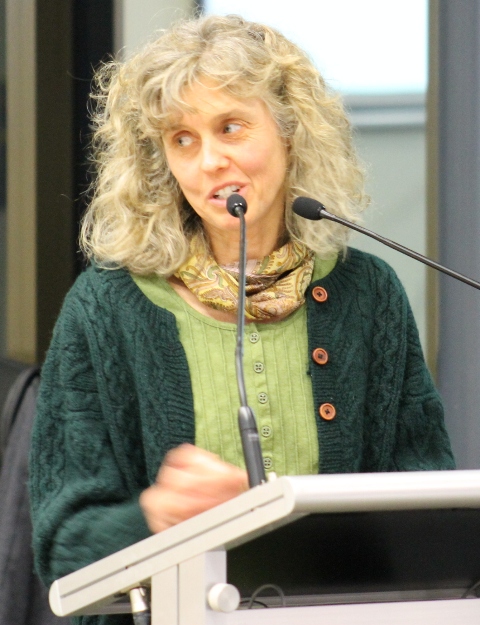 council truly love and respect it and wouldn’t it be wonderful if all the people in NSW could experience what we have experienced in living with a council that you can access and can work constructively with. I’m sure like many of the people in this room, we are part of many local groups, we are people who give lots of time voluntarily because we can and we’re also the sort of people that if we’re looking out the window or walking along and see something we don’t like, ring up council and write letters.
council truly love and respect it and wouldn’t it be wonderful if all the people in NSW could experience what we have experienced in living with a council that you can access and can work constructively with. I’m sure like many of the people in this room, we are part of many local groups, we are people who give lots of time voluntarily because we can and we’re also the sort of people that if we’re looking out the window or walking along and see something we don’t like, ring up council and write letters.
Tonight would be a night to say thank you to all the councillors I see around here, all the past and present council staff, because when those things have bothered me and bothered lots of you, big things like saving Currawong or smaller things like saving a bit of bush that you care about, when you ring up…someone answers the phone. They do return calls and emails, and they do try to work with you respectfully and constructively.
We, with our joint huge amount of pester power, which we sometimes devote to pestering council, will now devote that time by many many times, to pestering anybody who tries to take that privilege away from us.
I would like you to add a bullet point that I didn’t see in your earlier presentation; which to me is a missing link here with the reference to Einstein on things that count but cannot be measured. What you are seeing here tonight is an involved citizenry and that is the fundamental building block of a vital democracy. There has been much comment lately about the increasing tendency, particularly regrettably, of the younger generation that is coming along to not be quite as involved in local community groups and political guidance and in the whole process of democratic government. They learn from Pittwater though because what we have learnt form being part of Pittwater council is that anybody and better still, a group, can make a difference. All the people in our local and federal governments are genuine people trying to do a good job. In the case of Pittwater council and its staff we know they really care. It doesn’t mean always mean we’ll come back to exactly the same solution. When you engage in our process you begin to understand the very complex compromises and advances that anyone here has to make and so you are more engaged at the other levels of state and federal government.
If you want to create a very strong democracy people need to experience their ability to make a difference and experience it at the local level.
The other thing I’d like to add is that in my experience as a local public school primary teacher is that both Warringah and Pittwater councils do absolutely unique and fantastic jobs in supporting schools to educate their children about the local environment and about good citizenry. And again it is at that age that people learn that they can actually make a difference. The sorts of programs that both those councils offer are to my knowledge the best I have ever heard of and they are tailor3d to very specific environments.
One example of this is there is a specific and ecologically endangered community at Duffy’s Forest ; Warringah Council has a fantastic program to teach children about that through excursions to our environment centre where education officers are available. There are people who will visit the schools, people who will give you advice on looking after the environment by visiting local schools. The people who help schools look after their local bushland and educate their children are our local governments.
I would love it if you could get that as a model for the whole of NSW where you involve young people and involve citizenry that will then go on to care about other levels of government.
Karen Lambert on behalf of the West Pittwater Community Association
I’m speaking on behalf of the offshore areas of Pittwater tonight. And that is a very very particular and unique aspect that Pittwater has; an 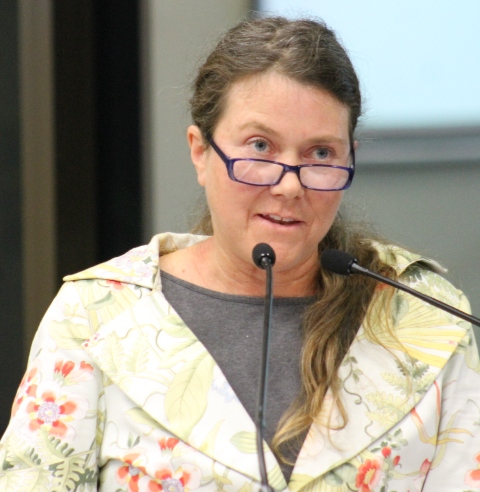 offshore community. To use an appropriate analogy I would say offshore communities would be swamped by amalgamation.
offshore community. To use an appropriate analogy I would say offshore communities would be swamped by amalgamation.
Pittwater’s offshore areas are a very particular…council has 28 wards they have to have to upkeep and maintain and the council, because of our unique situation with the Pittwater (estuary) and the waterways, actually works in partnership with the community there. That is really unique and really important. Many people have already spoken about our access to council so I won’t go there. I have had a number of people who dealt with the state government twenty-two years ago say this would be an incredibly backwards step.
The quality of the relationship we have with the council should be supported now and in the future. It’s sustainable now and we now it is the model that works for us and it should be taken up by your panel as such.
I’m just going to make a few points regarding some of the issues raised in your paper;
Pittwater has excellent consultation. Amalgamation would weaken this and we all know that the ‘local in local government’ works best. Again; we already have that so why would we want to change that.
Financial realities and fiscal responsibilities; Pittwater does not have these issues and I think all will acknowledge here that Pittwater really punches above its weight in this regard. It must be acknowledge that we, or council, provides infrastructure that benefits people in the wider metropolitan area as well as its own residents. We do that and we’re still financially viable so why would you change that?
With regards to infrastructure backlog; I think people have already spoke of SHROAC that offers opportunities to combine on economic on scale to provide services and infrastructure. That is already happening; amalgamation is not necessary to provide that.
Many of my points have been made already but I would like to raise this;
I did work in state government for 12 years and I do understand that the tyranny of remote locations is an issue, and I can understand the difficulty for people of western NSW. It’s a huge burden and Point 14 where you talk about the rural councils issues and I think that in general there is probably a feeling that metropolitan areas should support rural areas because in return we are supported by them. I also think that another issue that is felt in some parts of Pittwater is that the best vestment of infrastructure by state government through its instrumentalities and authorities and its surface delivery of infrastructure to councils needs scrutiny.
You made a point before about the buying power of a statewide Combined Council’s for low interest council loans; that’s a great idea but is not contingent upon amalgamation.
Finally, you mentioned that local councils are getting more complex. I’d like to suggest that part of this is because state government is decentralising its responsibilities to the councils and doing so because they’re cost cutting their own responsibilities and in doing so are shifting this burden onto local government.
We should be very wary of that; we should call a spade a spade and in closing; let’s keep Pittwater as it is. Thank you.
Fred Murry-Walker on behalf of the Clareville and Bilgola Plateau Residents Association (CABRA) – secretary
I am Secretary of the Clareville and Bilgola Plateau Residents Association which represents some 1000 households.
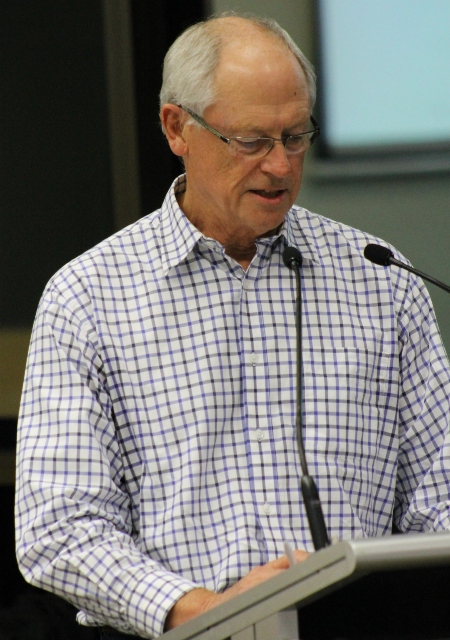 I would like to acknowledge the Guringai Aboriginal people as the original Custodian of our land and to say that I am extremely envious that they knew Pittwater before any development occurred.
I would like to acknowledge the Guringai Aboriginal people as the original Custodian of our land and to say that I am extremely envious that they knew Pittwater before any development occurred.
This address is a cut down version of our submission. We have eliminated the supporting detail in order to keep to your time limit.
Our first point is that there is an underlying attitude of ‘one size fits all’ and yet no compelling reasons are given.
Secondly, the report fails to consider alternate ways, both financial and procedural, that would lead to improving local governance.
We will give some quotes and they all come from “Better Stronger, Local Government: The Case for Sustainable Change". November 2012:
The first is Page 10 “Local government is the democratic representative of communities. It is ‘close to the people’. It can lead communities. It can be the voice of communities. It can moderate between competing interests. It can create places that make lives better. …To be an effective partner in the broader system of government, local Government must be both truly ‘local’ in the way it relates to communities, and Have the ability to address problems and emerging issues at a larger scale.”
Page 11, Box 2: You list 17 points under the heading, “Elements of an Effective System of Local Government”.
Pittwater may not be perfect but it comes pretty close to achieving those values and elements. But more importantly, although you identify them, you place no value on them in determining whether amalgamation is needed. It seems that the only criterion is ‘Bigger is Better’.
On Page 23, you actually say: “A ‘one size fits all’ approach is untenable.”we repeat, ‘untenable’.
Now we would like to turn your attention to alternate ways of improving local governance.
Page 9:
"On the whole, councils continue to deliver a reasonable range of services and do so quite efficiently. But on closer examination it becomes evident that underlying financial problems and infrastructure backlogs are mounting; grants are not being allocated sufficiently to areas of greatest need; many more councils should be applying for Special Rate Variations; efficiency, effectiveness and regional collaboration must be improved considerably to make the best use of scarce resources; there are too many layers of regulation; too many councils focus on compliance rather than performance; the local government associations need to play a stronger role;."
So what have governments, in particular the Department of Local Government, been doing to discharge their responsibility to support and oversight local councils?
You identify the problems, and then apply a pollyanna attitude that amalgamations will fix everything. This is lazy and fatuous thinking.
I am appalled at the lack of financial analysis in this report. Nowhere is there any detailed cost justification for amalgamations. It's all ethereal. If this was the private sector, proper business plans including detailed financials, costed benefits, implementation costs and risk analysis would be done. We are after, all talking, about 152 businesses with almost $10b revenue streams.
The elephant in the room is the State Government.
This proposal to amalgamate local government areas is fundamentally a funding problem. Nowhere in the reports have we found that local councils are over delivering on the level of service and infrastructure or that the funds are being wasted. On the contrary, the evidence is that available funds are being well applied but that they are insufficient, a result of decades of one size fits all state government imposed rate pegging.
The state government has the responsibility for managing the level of expectation of services and infrastructure to be delivered and having set that level, they are then responsible for the funding. They are entitled to force some self or local funding but if that is insufficient, the State Government must make up the shortfall or reduce the expectations. What they are not entitled to do is to impose arbitrary boundaries ignoring commonality of issues.
One more quote from Page 20 which obviously refers to the White Paper headed 'A New Planning System for NSW'.:
"There is a risk that policies designed to increase housing supply and improve affordability will impose an unsustainable burden on council budgets and ratepayers."
You see, while on the one hand the State government is whinging that local councils are inefficient, on the other hand they are imposing layer upon layer of cost.
Another example is the 'Overland Flow Mapping and Flood Study'. This was imposed on all councils and cost Pittwater at least $100k plus considerable ongoing costs. This money has been an utter waste. The risk may or may not be real but the problem could have been easily resolved by the State Government taking other action or even no action.
Our final point is to look at the very reason for this meeting. I'll bet that many millions have already been spent over the years getting to this point, yet, I'll bet that the need for more funding was intuitively known to any practitioner or academic familiar with the local government sector and I'll bet that the findings of this committee are nothing more than a political cover for the State Government to postpone and/or avoid its financial responsibilities.
We are not being disrespectful to you, but we are appalled at the waste of money when the aim is to save or at least spend more efficiently. We are appalled that so many people are wasting their time and money on matters that have self-evident solutions and we are particularly appalled that so much time and money will be spent on amalgamating council areas when amalgamation is not required and which would then be de-amalgamated as in other states.
In short, 'if it ain't broke, don't fix it.'
This sentiment is particularly felt in Pittwater. We fought hard and long for independence to prevent the destruction of our special character and to ensure the efficient expenditure of resources back to the community from which they were raised and we will continue to fight until you leave us alone.
We thank you for the opportunity to present our point of view.
